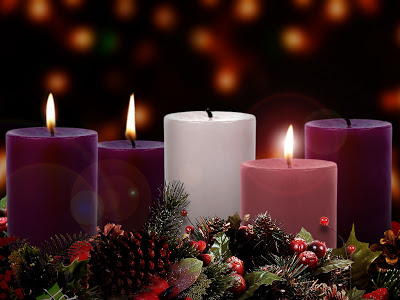 And now we come to the third week of Advent, or “the week of the pink candle,” as it is perhaps better known. In the midst of lighting darker purple candles as we walk through the Advent season of waiting and repentance, we light the one pink candle of joy to remind us that even as we walk in darkness and long for the coming of Immanuel, there is joy in our midst. And there are few things that bring joy like a sense of belonging, of being included and welcomed into fellowship with others. Yet even when we seek to embrace a spirit of welcome and inclusion, there is much we can do, say, even sing that communicates to one group of people or another that they are not really welcome at our table. Our authors this week take a look at the way the hymns in Glory to God do and don’t extend welcome to all people. What does this hymnal have to say to the LGBTQ community? How does it invite into worship people living with disabilities? Is there space in this hymnal’s understanding of God and of salvation history for all of creation, not just human beings? Are there times and places where inclusion can go too far? Our authors this week invite you to listen for the places where the joy of inclusion is breaking forth — and to join in the conversation and hallelujahs!
And now we come to the third week of Advent, or “the week of the pink candle,” as it is perhaps better known. In the midst of lighting darker purple candles as we walk through the Advent season of waiting and repentance, we light the one pink candle of joy to remind us that even as we walk in darkness and long for the coming of Immanuel, there is joy in our midst. And there are few things that bring joy like a sense of belonging, of being included and welcomed into fellowship with others. Yet even when we seek to embrace a spirit of welcome and inclusion, there is much we can do, say, even sing that communicates to one group of people or another that they are not really welcome at our table. Our authors this week take a look at the way the hymns in Glory to God do and don’t extend welcome to all people. What does this hymnal have to say to the LGBTQ community? How does it invite into worship people living with disabilities? Is there space in this hymnal’s understanding of God and of salvation history for all of creation, not just human beings? Are there times and places where inclusion can go too far? Our authors this week invite you to listen for the places where the joy of inclusion is breaking forth — and to join in the conversation and hallelujahs!
 I Wonder if We Mean it This Year, Daniel Williams
I Wonder if We Mean it This Year, Daniel Williams
A few weeks ago, a friend of mine was telling me about the first time her partner accompanied her to the PC(USA) General Assembly. She told me that they were there to be a witness to the Church, to join their voices with many others in calling for the full welcome, inclusion, and affirmation of God’s lesbian, gay, bisexual, transgender, and queer children.She told me about their experience in the opening worship of the Assembly. She said that during the service, her partner reached into her purse, pulled out a neon yellow highlighter… Continue Reading
 Body and Wholeness in Glory to God, Rev. Robin Lostetter
Body and Wholeness in Glory to God, Rev. Robin Lostetter
There is really no answer to the question of what a volume of 853 hymns will communicate to someone in the pew about justice and inclusion for persons living with a disability. What is communicated will depend upon the person who chooses the hymns to be sung in the particular faith community – Will it be the pastor? The music director? A praise team? Will there be recognition of such denominational themes as Disability Access/Inclusion Sunday? Are folk living with disabilities welcome, both architecturally and actually, into the life of the congregation? Continue Reading
 Borrowed Holy Land: The New Hymnal and Creation Justice, Charles Freeman
Borrowed Holy Land: The New Hymnal and Creation Justice, Charles Freeman
Images of nature and creation in hymnody are hardly new. The psalms, among the earliest songs of God’s people, are replete with images and celebrations of God’s good creation, and as ancient a text as Francis of Assissi’s “All Creatures of Our God and King” (#15) contains an exhilarating richness of natural imagery and a celebration of the created order. It is one thing, however, to celebrate creation and to deploy images of creation in praise of God; it is quite another thing to sing of creation as our partner in the justice of God… Continue Reading
 Can Inclusion Go Too Far?, Charles Freeman, Doug Brown, Rev. Carla Pratt Keyes, Miriam Foltz, Christopher Tweel, Beth Olker, Rachel Jenkins
Can Inclusion Go Too Far?, Charles Freeman, Doug Brown, Rev. Carla Pratt Keyes, Miriam Foltz, Christopher Tweel, Beth Olker, Rachel Jenkins
As an editor, I’m used to going in search of articles, but this time the article found me! While brainstorming for this Advent issue, I came across the following Facebook conversation among several friends. The hymn in question is “For Everyone Born” (#769) by New Zealand hymn writer Shirley Erena Murray. The hymn has already become a favorite of many welcoming and justice-seeking congregations, but one verse in particular has sparked both controversy and conversation. Continue Reading
 Searching for Us: 7 Ways the New Hymnal is Queer, Matthew Dimick
Searching for Us: 7 Ways the New Hymnal is Queer, Matthew Dimick
After the General Assembly 219th in 2010 lifted the ban on the ordination of gay, lesbian, and bisexual individuals, the leadership at my past church thought it might be a good idea to host a couple of evening classes to inform individuals about the issues voted upon in Minneapolis. From the outset, it became clear that the views expressed by the majority of those in attendance would not be altogether favorable of the changes. One particular quote from those conversations that has stayed with me was when an older gentleman shared this insight: “If God wanted us to accept gay people, then there would be gay characters in the Bible!” Continue Reading
Read more articles in this series.









Pingback: Yet ANOTHER example of “Gay Theology” | God's Recruit